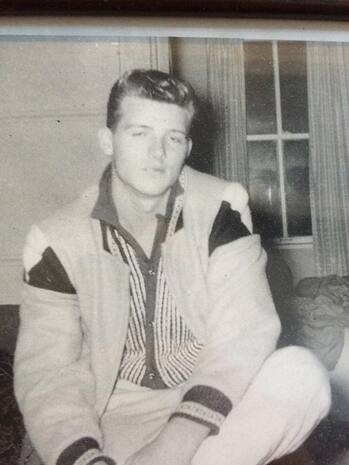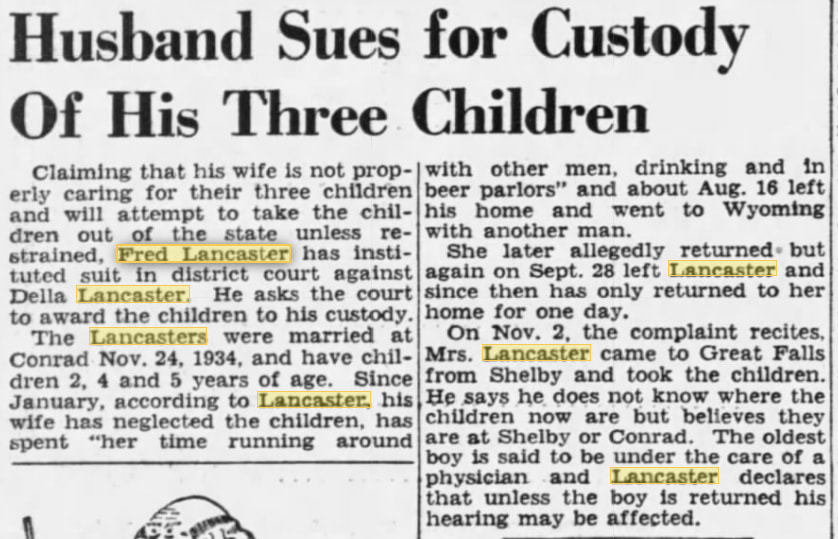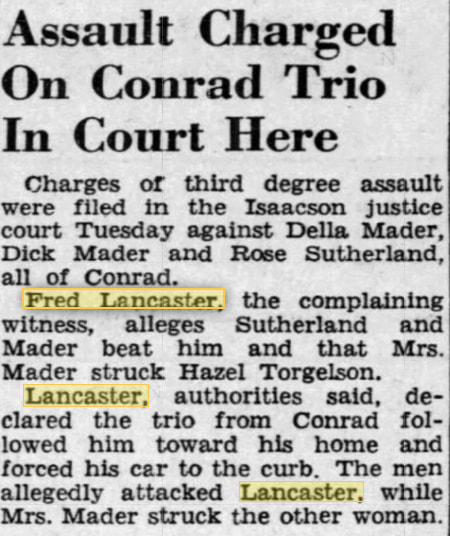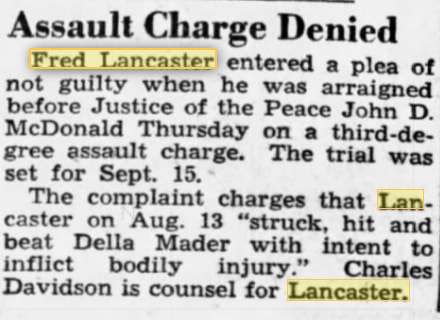|
7/13/2021 0 Comments Down the Rabbit Hole …... and into the rest of the story, or at least more of it. I've been on the masthead of Montana Quarterly for the better part of a decade now. But back in 2010, when I had one novel to my name and not much else in the way of published literary work, I was just a guy pitching an essay to Megan Regnerus, then the magazine's editor and now our beloved editor emeritus. I called it The Small Things, and it was written after my father, Ron, and my Uncle Bob Witte (RIP) ventured out to the Fairfield Bench, near Great Falls, and found the dairy farm that shaped Dad's young life in some pretty horrible ways. I won't say much else here; you can read the piece for yourself, and I hope you will, because it provides a good anchoring for some discoveries I recently made while digging through archives. Long story short: I've always wondered about some of the details my father told me that day on the bench, not because I thought him dishonest about the general gist of things, but because he was 71 years old (he's 82 now), and that's a lot of time for the finer points to get lost. But he hadn't lost them. Not really. Let's dig in ... From the piece: "I’d heard, or maybe I’d assumed, that my paternal grandfather, Fred, had walked out on the family when Dad was two or three years old. But here was Bob, telling me that it had been a proper divorce and that Dad’s mother had rejected the children." The archives say ... Pretty much dead-on, if Fred's account of it is to be believed. He sought the divorce. He also tried to get the children (Dad, his older brother Duaine, his older sister Dolores). From the piece: "When Fred showed up to get Dad a week later, Dick locked the little boy in the basement and met Fred at the road. He carried a shotgun, all the better to send Fred on his way. Three children could accomplish a hell of a lot more work than two, and Dick aimed to keep Dad close, be it with a gun or a fist or a horse whip." The archives say ... Nothing I found speaks directly to this episode. Still, I'm not about to contradict Dad; he remembers it, he's shaken by it all these years later, and trauma has a way of imprinting itself immutably. What I know for sure is that Fred and Della and the man who became her new husband, Richard Mader, had confrontations. Here's the evidence: I've saved the best one for last. The remembrance of my father that was shrouded in the most mystery was where he went and what he did when he finally ran away from Richard Mader's dairy farm for good. Dad's memory is that he went to work for a farming family near Three Forks. I had no reason to disbelieve him, of course, but Three Forks is a fair distance from Fairfield. I wondered how he got there and whether he might have actually ended up somewhere else, somewhere closer, and just lost the place to the intervening years. Nope. From the piece: "After a few weeks, he ended up on a farm in Three Forks, doing odd jobs and being attended to by a kind family that kept him shielded from Dick, who was still looking for him. After a year or two, Dad told the farmer that he would like to see his father again, and the man agreed to find Fred and take Dad to him. A few weeks later, word came: Fred was in Butte. "More than fifty years later, Dad’s voice broke and his eyes floated in tears as he revealed what happened next. They were the only emotions he betrayed in telling the story. “'The farmer told me, "I’ll drive you to Butte and once you’re there, I’ll put you in a cab and follow you to your father’s house. Once I see that he’s come out to get you, I’m gone." ' "In a singular act, that Three Forks farmer, whose name has been lost to the intervening years, did for Dad what no one else could be troubled to do: He acted in the best interest of the child." The archives say ... Well, just have a look from a newspaper's "persons sought" column:  Dad, early 1960s. Dad, early 1960s. Getting at the details of my father's life has been a driving pursuit for many of my own days. Part of it is that I'm his only child, and if there's a story to be salvaged, it's up to me to mine it and tell it. And part of it is that I'm so heartbroken for the boy he once was, a clearly smart youngster who was denied so many of the blessings of his age, who was brutalized and stunted and who has persevered despite it all. I know how violence cycles from generation to generation, and I also know that the man I call Dad has refused to spin it on into me. It's the great achievement of his life, and he probably doesn't even know it. I want to drag the shit that happened to him into the light, the best disinfectant for what was visited upon him. He's not a hero. He is, in fact, a deeply flawed man (as is his son, as was his own father—there's more to that story, for another time). But he's my dad, and I love him. Addendum: There's an earlier piece, originally published by the San Jose Mercury News in 2004, that focuses more on finding out what became of Fred after Dad reunited with him in the mid-1950s. That was the last time father and son saw each other. Dad went into the Navy, and Fred went ... well, that's the interesting thing. You can read about that here.
0 Comments
Your comment will be posted after it is approved.
Leave a Reply. |
About CraigCraig Lancaster is an author, an editor, a publication designer, a layabout, a largely frustrated Dallas Mavericks fan, an eater of breakfast, a dreamer of dreams, a husband, a brother, a son, an uncle. And most of all, a man who values a T-shirt. Archives
July 2024
By categoryAll 600 Hours Of Edward And It Will Be A Beautiful Life Awards Books Bookstores Community Connection Craft Craig Reads The Classics Dreaming Northward Education Edward Adrift Family Geography History Libraries Memory Montana NaNoWriMo Northward Dreams People Plays Poetry Public Policy Q&A Social Media Sports Stage Texas The Fallow Season Of Hugo Hunter The Summer Son This Is What I Want Time Travel Work Writers Writing Archives
July 2024
|





 RSS Feed
RSS Feed